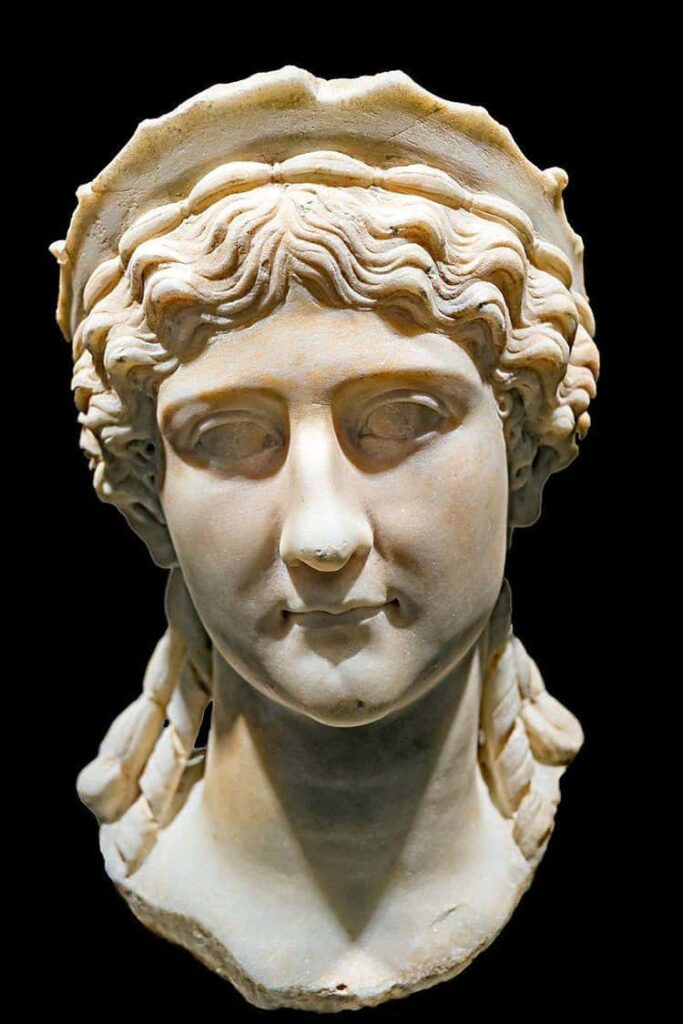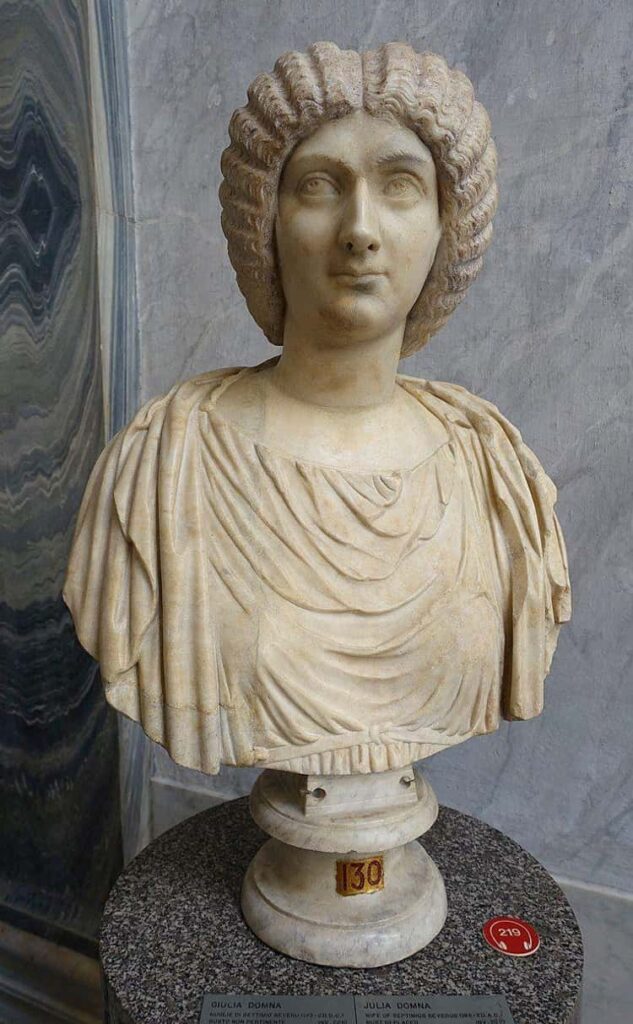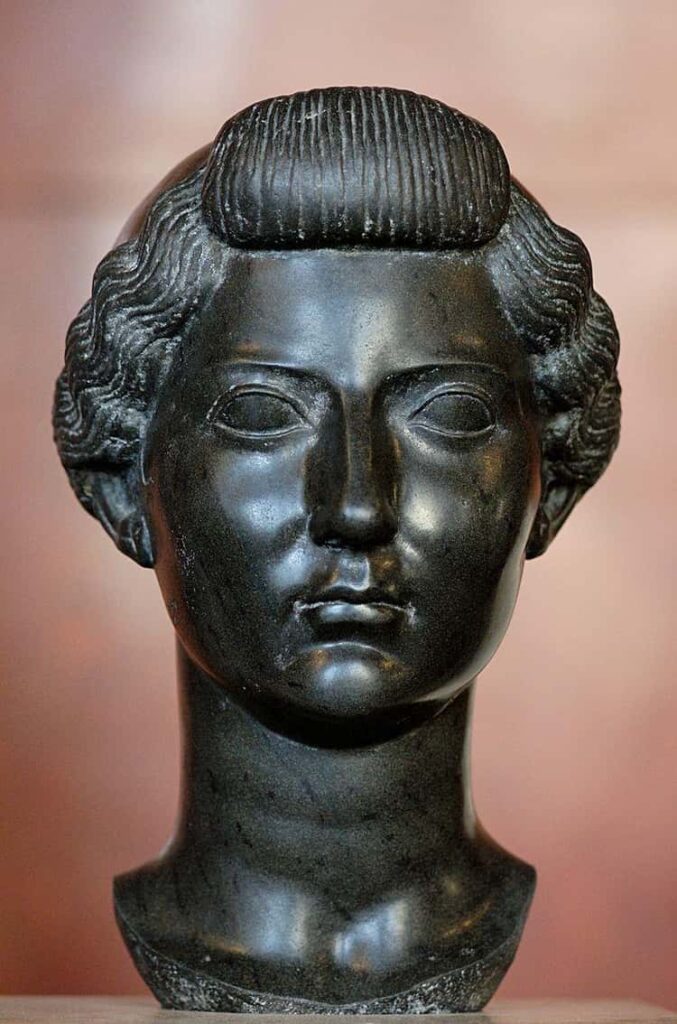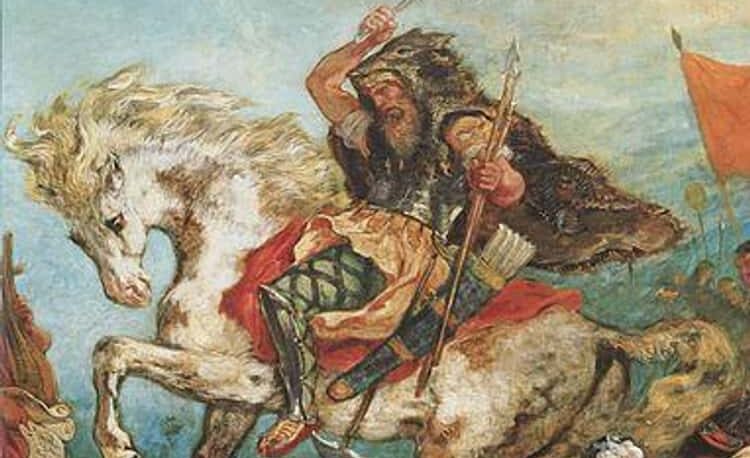While films like Gladiator (which depicts the tumultuous reign of the Emperor Commodus) and series like HBO’s Rome can stray far from the actual facts of life in Ancient Rome, they do a decent job of showing the prominent roles women played in the affairs of its political leaders. Thus, whatever liberties movies and shows might take with the real history of the time, it does allow contemporary viewers to see the extent to which Roman women could and did influence the empire.
Some of these formidable women wielded power behind the scenes, some did it from within the bedroom, and a select few could be considered co-rulers with their more famous male counterparts.
1. Servilia Caepionis Was Julius Caesar’s Lover And The Mother To His Foremost Assassin

Servilia Caepionis hailed from one of the most respected families in Ancient Rome and was related to some of the Republic’s most important men. Among others, she was the elder sister of Cato the Younger, one of the most dedicated opponents to Julia Caesar. In a bit of an ironic twist, however, Servilia herself became one of Caesar’s numerous conquests. There were even rumors he was the real father of her son, Brutus. Casar, with his own ironic sense of humor, even read out of one of her love letters during a Senate meeting, much to Cato’s chagrin.
As was so often the case in the late days of the Roman Republic, politics soon trumped personal relations. Her son Brutus would go on to become one of the foremost assassins of Julius Caesar. She also had another connection to the assassins: one of her daughters was married to none other than Gaius Cassius Longinus, one of the other leaders.
2. Agrippina The Younger Married Her Uncle – And Then Had Him Poisoned

Few Roman women achieved quite the level of infamy as Agrippina the Younger. Born with impeccable bloodlines – her great-grandfather was Augustus himself – she seemed destined for greatness. Though she fell afoul of her brother Caligula when he ascended the throne, she soon returned to power. She even married her uncle, the Emperor Claudius. The marriage was politically expedient, as it allowed for a joining of the two rival branches of the imperial family.
However, Agrippina wasn’t content to simply be the wife of the emperor, and she particularly wanted to see her son, Nero, on the throne. To that end, she is reputed to have poisoned her uncle/husband.
Accounts differ as to how exactly it was done – whether with poisoned mushrooms or a feather – but the end result was the same. Nero ascended the throne, and Agrippina attained the power she longed for. Unfortunately, her son grew tired of her presence and ultimately had her murdered, first by attempting to have her drowned in a collapsing boat and then, when that had failed, having soldiers cut her down in her own villa.
3. Justa Grata Honoria Proposed Marriage To Atilla The Hun

During the later years of the Roman Empire, few figures were quite as terrifying as Atilla the Hun. He seemed to be a scourge sent from God to punish people for their wickedness, and he seemed to pose a threat to the very existence of the Empire itself. Perhaps because of this, he seemed an ideal candidate for marriage for a dissatisfied Roman princess, Justa Grata Honoria, the daughter of the formidable Galla Placidia and sister of Emperor Valentinian III.
Like the other members of her family, Justa Grata Honoria wasn’t content to take what was offered her but instead wanted to make life on her own terms. To this end, she proposed marriage to the barbarian chieftain, allegedly even sending him a ring. For her pains, she was nearly executed by her brother, who was only moved to mercy by their mother.
Ultimately, she was safely married to a reliable Roman nobleman, and she disappears from history. For his part, Atilla used her marriage proposal as a pretext for invasion. After being denied a dowry, he invaded.
4. Antonia The Younger Starved Her Own Daughter To Death

Antonia the Younger was one of the numerous daughters of Octavia the Younger, the sister of the Emperor Augustus. As such, she was raised in the halls of power. For the most part, she epitomized the virtues expected of a Roman matron, and she was often willing to toe the party line when it came to the politics of Rome’s foremost family. She was the mother of several children, one of whom would go on to become emperor: Claudius.
It was her relationship with her daughter, Claudia Livia (often known simply as Livilla), which would prove to be one of the most tragic in her life. Livilla was implicated in the efforts of Sejanus, the praetorian prefect, to kill the Emperor Tiberius and seize the throne, a rebellion that resulted in a terrible and bloody purge.
Tiberius, hearing of Livilla’s involvement with Sejanus’s plot – as well as her potential poisoning of her husband – rendered her to Antonia for punishment. Accordingly, Antonia locked her daughter away and starved her to death.
5. Fulvia Led Soldiers In An Uprising To Help Her Husband, Marc Antony

The late Roman Republic was a time of tremendous political upheaval, as the entire Roman world was repeatedly convulsed by civil war. In this context, many women were able to achieve a truly extraordinary level of power. Fulvia, for example, has gone down in history as one of the most formidable individuals of this period.
She was married three times, and each time she showed her political shrewdness. In one notable example, she used the body of her husband Clodius, who had just been assassinated, to spark a riot – all in an effort to bring his murderer to justice.
Marc Antony was, in fact, her third husband, and she would prove to be a valuable ally for him. In fact, she played a key role in Antony’s conflict with Octavian, leading troops in his name (though he would later disavow her actions). She is also famous for taking a hairpin to the tongue of the executed Cicero, who had been one of Antony’s most devoted enemies.
6. Octavia The Younger Was Married To Her Brother’s Archenemy

Like many Roman women of her class, Octavia the Younger was fated to play a major part in her family’s dynastic prospects. This was especially true once her brother, Octavian (the man who would become Augustus), set his sights on the pinnacle of power.
It wasn’t long before Octavian used his sister to forge a fragile sort of peace with Marc Antony, the only other man in the Roman Republic who could both lay claim to being the heir to Julius Caesar and pose a threat to his own dominance. Unfortunately, despite his marriage to Octavia, Antony began his notorious relationship with the Egyptian queen Cleopatra VII. This was a scandal not only for Octavia and her family, but to all of Rome.
Octavia returned to Rome, where she would continue to play a notable role in her brother’s life. She exemplified the Roman matronly virtues of stability and circumspection. In addition to raising her own formidable brood of children – which included several daughters with Marc Antony – she also took in several others, including Antony’s children with Cleopatra.
7. Faustina The Younger Supported A Revolt Against Her Own Husband

Faustina the Younger was the daughter of Emperor Antoninus Pius. She was married to her cousin, the young man who would eventually succeed her father as the Emperor Marcus Aurelius. For most of their marriage the two were very close, and the emperor actually awarded his wife several notable honors. They also produced a large brood of children, including the man who would ultimately succeed his father, the infamous Commodus.
In 175 CE, having received faulty intelligence stating her husband was near death, Faustina wrote to the general Avidius Cassius for help. He would declare himself the new emperor. Unfortunately, Marcus Aurelius was still very much alive and quickly put down Cassius’s revolt.
It is possible that Faustina subsequently took her own life, though scholars are unsure of her fate. Despite her apparent treason, Marcus Aurelius still held Faustina in high esteem, and had her declared a goddess after her death.
8. Julia Domna Had To Watch One Of Her Sons Murder The Other

Along with her sister, Julia Maesa, Julia Domna was born into a priestly family in the city of Emesa. She would go on to marry Septimius Severus, who made a bid for the throne in the chaotic times after the death of the Emperor Commodus and the end of the Antonine Dynasty. She would bear her husband two sons, Caracalla and Geta. What’s more, she would become a notable patron of various intellectuals.
Unfortunately for Domna, her sons despised one another. For a time, she managed to keep them from engaging in all-out conflict. When their father died, however, things turned ever more sour. Caracalla, in particular, did not want to reign alongside his brother. He eventually murdered the other man, who died in his mother’s arms.
Domna would go on to continue serving as an adviser to her surviving son, before succumbing to what was most likely cancer (though some suggest she might have starved herself to death).
9. Livia Drusilla Became One Of The Most Powerful Women In Roman History

Few Roman women had as eventful a life as Livia Drusilla. Born into a powerful family in the waning days of the Roman Republic, her first husband repeatedly turned his coat in an attempt to stay on the winning side. Though she would have two children with him – young men known by historians as Tiberius and Drusus – it was her marriage to the young Octavian that would give her true power.
As the wife of the man who ultimately became the first Roman emperor, Livia wielded extraordinary influence. Of course, she did so behind the scenes, and she was always careful to maintain an image as the subservient Roman matron.
After Augustus’s death, she would also engage in a bit of a power struggle with her son, Tiberius, who seemed to resent the influence his mother wielded over political affairs. In fact, she would not be declared a goddess until the reign of her grandson Claudius. Despite the tumultuous years of her life, she outlived most of her friends, family, and enemies, dying around age 86.

